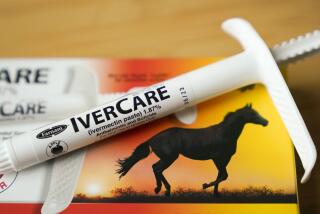‘Hoxsey’: Quacks & Cures
- Share via
I’d like to respond to inaccuracies in the letters from Justin Fishbein and James Hague regarding my film “Hoxsey: When Healing Becomes a Crime” (Saturday Letters, Oct. 15). As Fishbein points out, Harry Hoxsey’s suit was against his father, Dr. Morris Fishbein (longtime editor of the American Medical Assn.’s journal), as well as the Hearst newspapers and its representatives.
Hoxsey was awarded $1 in damages, as well as $1 for libel and slander against Dr. Fishbein. The same suit was tried a second time in 1952 solely against Dr. Fishbein, who was found guilty of all counts of libel and slander.
The presiding judge in his ruling remarked that Hoxsey was not seeking a money judgment. In that Dr. Fishbein had widely attacked Hoxsey for 25 years as the most vicious of the “cancer quacks,” Hoxsey’s court victory was in fact quite astounding, and represented a landmark case.
Regarding Hague’s remark that the Federal Trade Commission took the first successful action against Hoxsey, he is incorrect; as both the film and Kevin Thomas’ review noted, it was the Food and Drug Administration.
While the FDA at various times claimed to have “tested” the Hoxsey therapy, my extensive review of such records found them to be a very thin soup. Certainly, none of them conforms to the standards afforded conventional treatments, such as double-blind studies. I found the FDA “tests” to be political, not scientific, in nature.
If Hague finds the idea of “closed-mindedness and vested interests” working against alternative cancer therapies to be poppycock, why does the U.S. Congress believe there is evidence ample enough to investigate? I am inevitably disturbed by critics who do not go to the source. These gentlemen would do well to see the “Hoxsey” film itself at the Monica 4-Plex.
KEN AUSUBEL
Producer, “Hoxsey: When Healing
Becomes a Crime”
More to Read
Only good movies
Get the Indie Focus newsletter, Mark Olsen's weekly guide to the world of cinema.
You may occasionally receive promotional content from the Los Angeles Times.








